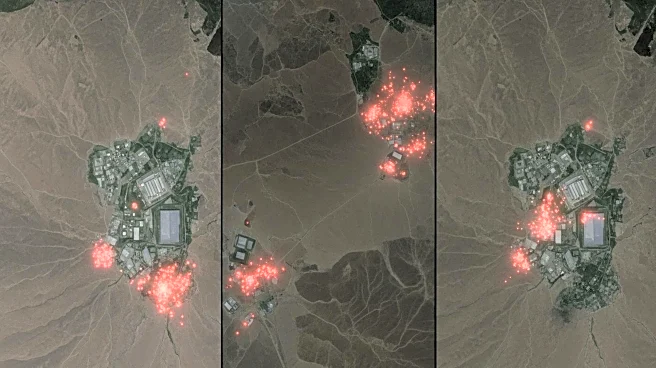What's Happening?
Satellite observations have identified persistent fire clusters near U.S. military bases in Iraq and Afghanistan from 2002 to 2012. The study utilized MODIS active fire detections to map combustion sources, revealing significant fire activity near bases, particularly in Iraq. The research found 285,810 fire detections in Iraq and 3,702 in Afghanistan, with Iraq showing higher fire radiative power (FRP) due to industrial combustion sources like oil and gas flaring. The study highlights the sustained use of burn pits and other combustion sources during U.S. operations, with notable peaks in fire activity corresponding to base closures and waste disposal efforts. In Afghanistan, fewer fires were detected, with clusters being less persistent and more dispersed, reflecting the smaller scale of operations and the introduction of incinerators to reduce open-air burning.
Why It's Important?
The findings underscore the environmental impact of military operations, particularly the use of burn pits, which have been linked to health issues among veterans. The persistent fire clusters near bases indicate ongoing combustion activities that contribute to air pollution and potential health risks. The study provides a method to attribute PM2.5 exposure to specific fire sources, aiding in the assessment of environmental and health impacts. This research is crucial for policymakers and military planners to address the environmental footprint of military operations and implement measures to mitigate pollution and health risks associated with combustion sources.
What's Next?
The study's methodology could be applied to other regions to assess the environmental impact of military operations globally. There may be increased scrutiny and calls for policy changes regarding the use of burn pits and waste disposal practices at military bases. Veterans' advocacy groups might push for more comprehensive health studies and compensation for those affected by exposure to combustion-related pollutants. Additionally, the military may consider adopting cleaner technologies and waste management practices to reduce environmental and health impacts.
Beyond the Headlines
The research highlights the ethical considerations of military operations and their environmental impact. The use of burn pits raises questions about the responsibility of military forces to minimize harm to local environments and communities. Long-term exposure to combustion pollutants could lead to chronic health issues, necessitating a reevaluation of military waste management practices. The study also emphasizes the importance of satellite data in environmental monitoring, offering a valuable tool for assessing and mitigating the impacts of human activities on the environment.









